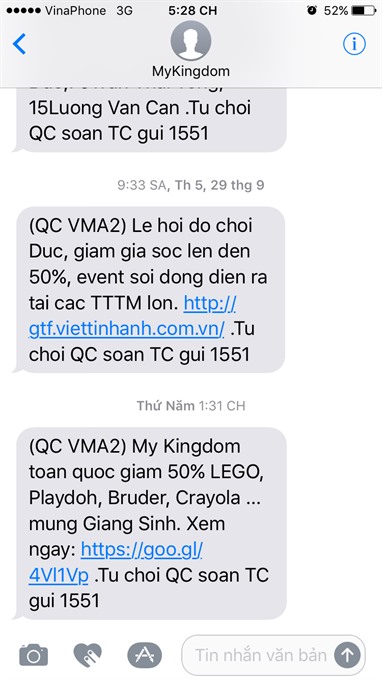 Society
Society

Nearly 14 million spam messages are frustrating phone users acroos the country every day despite efforts by information and telecommunication authorities to combat them.
 |
Nearly 14 million spam messages are frustrating phone users across the country every day despite efforts by information and telecommunication authorities to combat them. — VNS Photo Trương Vị |
HÀ NỘI -- Nearly 14 million spam messages are frustrating phone users across the country every day despite efforts by information and telecommunication authorities to combat them.
The figure, given out at conference on information and telecommunications management held by the Ministry of Information and Communications (MIC) at the weekend, was proof of the failure to control and prevent spam messages.
Officials and experts at the conference blamed the issue on loose subscriber management from telecommunication service providers and fragile punishment mechanisms from authorities.
“Wiping out spam messages and illegal mobile phone SIM cards is the responsibility of the service providers. If providers can not do that, the head of the company should be fired and replaced,” said Minister of MIC, Trương Minh Tuấn at the conference.
The minister vowed to handle the situation of spam messages, illegal SIM cards and even spam calls, stressing the role of mobile phone companies.
“It is now time to completely wipe them out,” said the minister.
Tuấn said spam phone calls were also spreading at an alarming rate without any intervention from mobile phone network providers causing annoyance to users.
He himself was a sufferer of this problem, saying that in just one day, he had received three spam calls, all related to advertising.
The MIC minister suggested a promotional programme to boost the use of post-charged subscribers in the near future.
Discussing measures to undertake, particularly tasks of provincial departments of information and communications, Lê Quốc Cường, Deputy Director of HCM City Department of Information and Communications supported MIC and Minister Tuấn for his determination to combat the issue.
Cường revealed the role of preventing this problem was not only focused on authorities but also the subscription providers.
He cited HCM City as an example, saying that currently the city has a total of 13 million citizens, most of them with at least one SIM card, so it was extremely hard for the city department to investigate or examine the surge of spam messages spreading across the city.
“It was hard because subscriber service providers in the city do not provide authorities with adequate figures and details of their customers. The companies that provide mobile phone services do not give out specific information about their handling of the violations, including details of customers that used illegal SIM cards to spread spam messages,” said Cường.
Thus, the official said, the main and most effective solution should come from the subscription providers and mobile phone service companies who need to be toughed and more transparent in their operations.
“Telecommunications businesses need to be "squeezed" and there must be clearer mechanisms, and closer co-ordination between business and authorities in controlling the spread of spam messages and the use of illegal SIM cards,” according to Cường.
Meanwhile, another representative from Đà Nẵng City’s Department of Information and Communications, who did not want to give a name, said one could buy a SIM card without original certification anywhere in the city.
"This was unacceptable", said the official.
That was proof of loose management and irresponsibility of the providers, particularly towards national security, the official said, adding that this also caused problems for the national telephone number sources as well.
According to the Việt Nam Computer Emergency Response Team (VNCERT) in 2016, it received nearly 600,000 complaints about spam messages, most of them were ads, via the 456 channel alone. Of these, 35 per cent were about telecommunication services, 20 per cent about real estate and 13 per cent about ads for SIM cards with rare telephone numbers.
A report from MIC revealed about 2 million subscribers had been found active on the distribution channel but without any user information.
As of December 22 this year, about 15 million virtual mobile phone subscribers accounts had been locked, the report said.
The virtual subscribers were the major sources of spam messages, and organisations and individuals had used such SIM accounts to spread their ads, according to the report. VNS